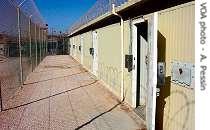2006年VOA标准英语-US House Passes Bill Allowing Military to Try D(在线收听)
By Dan Robinson
Washington
27 September 2006
The House of Representatives Wednesday approved legislation establishing new guidelines for the handling of terrorist suspects in U.S. custody. The 253 to 168 vote was preceded by emotional debate.
----
 Exterior of bunkhouse at Guantanamo |
||
A Supreme Court ruling last June struck down Bush administration plans for military tribunals, and formed another backdrop for the debate.
With the White House and Americans watching closely, Republicans such as Congressman Duncan Hunter argued that on-the-ground realities facing American intelligence and military personnel underscore the importance of the legislation.
"In this new war, where intelligence is more vital than ever, we want to interrogate the enemy," said Duncan Hunter. "Not to degrade them, but to save the lives of American troops, American civilians and our allies. But it is not practical on the battlefield to read the enemy their "Miranda" warnings [legal rights]."
Democrats and Republicans disagreed over key aspects of compliance with the Geneva Conventions, habeas corpus (an order to formally charge a detaine), or the right of a detainee to seek release from unlawful imprisonment, and definitions of coercion during interrogations and admissibility of evidence.
Republicans such as Congressman Jim Saxton repeatedly pointed to provisions they say prohibit torture and provide basic fairness.
"It outlaws torture, mandates decent treatment for enemy unlawful combatants who are in our custody, protects Americans from frivolous lawsuits and prosecutions, and most critically provides a fair, balanced and civilized process by which the international war criminals may be held accountable for their action," said Jim Saxton.
Democratic Congressman Ike Skelton points to provisions he maintains leave the legislation and military tribunal rulings resulting from it open to court challenges on constitutional grounds.
"Provisions that strip the federal courts of jurisdiction over habeas corpus," noted Ike Skelton. "Article One of the Constitution prohibits ex-post-facto [retroactive] laws, that is what this creates. It is questionable as to whether under Article Three of the Constitution the Supreme Court would uphold a system that purports to make the president the final arbiter of the Geneva Conventions."
Debate was interrupted three times by protesters shouting from the visitor's gallery of the House chamber.
PROTESTER: "We need to observe the Geneva Conventions!"
Senate lawmakers began an extended debate on their version of the bill. Republican leader Bill Frist urged quick approval.
"The American people can't afford to wait, even though we are in the midst of an election year this issue, the safety and security of the American people should transcend partisan politics," said Bill Frist.
Democrat Carl Levin says the Senate measure, contains "modest improvements" from an original Bush administration version, but asserts the legislation still undermines U.S. legal principles.
"The changes that appear in the bill which is now before us, taken together, will put our own troops at risk if other countries decide to apply similar standards to our troops if they are captured or detained," pointed out Carl Levin.
The Republican-controlled House rejected a last minute Democrat attempt to turn back the bill.
Senate approval of its version would clear the way for President Bush to sign it into law before the mid-term legislative elections November 7.